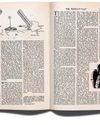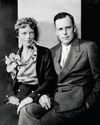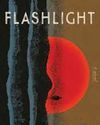CATEGORIES
Kategorien
Neueste Geschichten

Elif Batuman on Vladimir Nabokov's "The Perfect Past"
Eleven chapters of Vladimir Nabokov’s autobiography, “Speak, Memory,” initially appeared, out of order, in The New Yorker.

AN UPDATE ON OUR FAMILY
First, a sincere thanks to the friends, neighbors, and homeowners' association representatives who have reached out during the past four months. We've heard from so many of you—a couple of times via a note tied to a rock thrown through our window—as we've navigated this journey.

SOUND CHECK DEPT.SUPERGROUP
Stephen Malkmus likes tennis. He recently moved to Chicago, with his wife, Jessica Jackson Hutchins, and tries to play at least once a week.

GOINGS ON
What we're watching, listening to, and doing this week.

CONTINUING EDUCATION DEPT.TUSKS UP
In early May, the N.H.L.’s newest team, a year-old Salt Lake City-based franchise provisionally known as the Utah Hockey Club, unveiled its official name and mascot, after considering such options as Black Diamonds, Blast, Blizzard, Canyons, Caribou, Freeze, Frost, Fury, Glaciers, Hive, Ice, Mountaineers, Outlaws, Powder, Squall, Swarm, Venom, and Yeti. Behold: the Utah Mammoth.

AUTOCRACY NOW!
Curtis Yarvin' calls for an American king once seemed like a joke. Today, the right is ready to bend the knee.

THE LOST TYCOON
“The Phoenician Scheme.”

THE PICTURES: NERDCAST
Griffin Newman, a host of the podcast “Blank Check,” stood in the Museum of the Moving Image, in Astoria. Above his head hung a black motorbike, made for Tom Cruise's climactic cliff-jumping scene in the 2023 movie “Mission: Impossible—Dead Reckoning.”

THE TALK OF THE TOWN
The chaos of Donald Trump’s Presidency often obscures its rank consistency.

THE HEAT OF THE MOMENT
To stop violent crime, we need to grasp what really drives it.

AWAKENINGS
Whatever happened to Margaret Fuller?

ELIAS
Fiction

ANNALS OF AVIATION - TURBULENCE
Amelia Earhart’ husband pushed her to keep tempting fate for the sake of fame.

STILL LIFE
The “forever business” of Green-Wood Cemetery.

BROTHERS OF THE CLOTH
The Met's take on Black male style.

A CHINESE-BACKED SOAP-OPERA APP IS KEEPING L.A. ACTORS EMPLOYED
SECRET BILLIONAIRES. AGE-GAP MARRIAGES. PLENTY OF REVENGE.

AN ORIGINAL VAMPIRE MOVIE LED BY MICHAEL B. JORDAN REVIVED THE BOX OFFICE
UNTIL RECENTLY, THE SINNERS STAR WAS LEFT OUT OF THE CONVERSATION ABOUT MOVIE STARDOM. NO ONE'S DOUBTING HIM NOW.

A STREAMING SERVICE FOR IMPROV NERDS SOLD OUT THE GARDEN
HOW DROPOUT BECAME THE INDUSTRY'S UNLIKELIEST SUCCESS STORY.

The Trouble With Men
Hugh Jackman and Liev Schreiber lead a pair of plays about master manipulators.

Not Everything Is Illuminated
Susan Choi's Flashlight is a gorgeous reflection on memory's elusiveness.

Abundant Populism
The GOP is closing in on a massive wealth transfer. Can Democrats unite their warring visions?

EVEN NETFLIX IS JEALOUS OF YOUTUBE
MANY LIKE TO PRETEND THEY DIDN'T SEE THE PLATFORM WINNING THE STREAMING WARS. INDUSTRY INSIDERS SAY OTHERWISE.

This City Is Ready for More Fro-Yo
Pistachio drizzles top artisanal swirls while chains plot a return to prominence. Is the next big yogurt boom here at last?

EVERYONE IS ALREADY USING AI (AND HIDING IT)
WITH DOZENS OF NEW STUDIOS AND RAPIDLY EVOLVING TECH GENERATIVE VIDEO IS MORE EMBEDDED IN HOLLYWOOD THAN WE MAY REALIZE.

Oops, I Muraled Again
A crafty couple in Jackson Heights cover their one-bedroom apartment in floor-to-ceiling color.

Neighborhood News: Garden-Variety Maniacs
A game-five win in the Conference Finals had Knicks fans daring to believe.

HOLLYWOOD HAS LEFT LOS ANGELES
FOR YEARS, STUDIOS FOUND IT CHEAPER TO SHOOT ELSEWHERE. AND NOW THAT THE INDUSTRY HAS COLLAPSED, ELSEWHERE IS THE ONLY PLACE THEY'LL SHOOT.

Treating ADHD in Women Is a Bloody Mess
Diagnoses are on the rise—and so are complaints that menstruation weakens treatment.

Noor Abdalla
With her husband, Mahmoud Khalil, locked in a detention center almost 1,500 miles away, the dentist is suddenly a single parent.

You Just Can't Top Vaseline
WHILE WE'VE GOT nothing against tiny pots of expensive scented goo, the truth is that Vaseline Lip Therapy Original Mini ($3)-the classic, the staple-is the most effective everyday treatment for dry, cracked lips.
